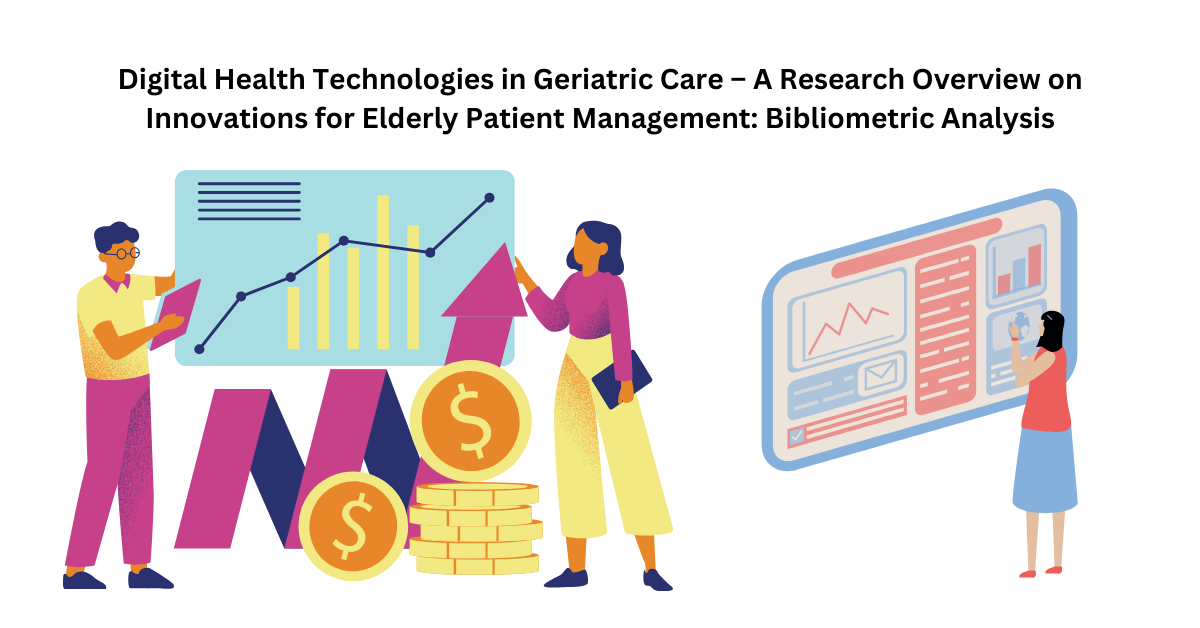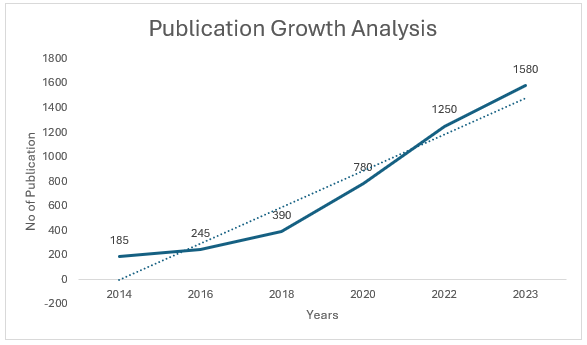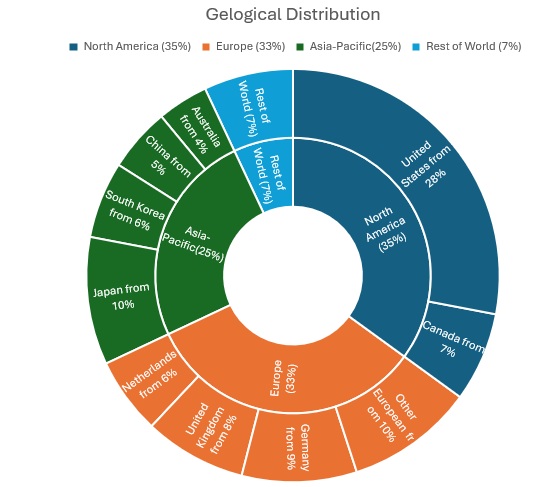The Digital Health Technologies in Geriatric Care – A Research Overview on Innovations for Elderly Patient Management: Bibliometric Analysis along with its discussion results and key domains.
Bibliometric Analysis: Digital Health Technologies in Geriatric Care – A Research Overview on Innovations for Elderly Patient Management
Abstract
An evolution in the digital healthcare technologies for geriatric nursing care are examined in this bibliometric analysis on publication made during 2014-2024. The analysis of the trends research impact, and geographical distribution are studied for a proper insights about the technological advancements for elderly care in healthcare settings.
Introduction
For geriatric care, globally drive a significant increase in the advancements of digital healthcare technologies for aging populations. In this analysis research-landscapes show, identify key trends, technological innovations, and its outcomes for the care of elderly patients.
Methodology
Analysis based on data extracted from major and well reputed journal’s database including PubMed, Scopus and Web of Science. This analysis is based on the systematic reviews, clinical trials and peer-reviewed articles published between 2014-2024.
Results and Discussion
Publication Growth Analysis
Publication volumes demonstrate consistent growth on an annual basis: (Year/No of publications)
- 2014/185
- 2016/245
- 2018/390
- 2020/780
- 2022/1,250
- 2023/1,580
Geographical Distribution (2014-2024)
Research output taken from worldwide regions details of percentage and subdivisions given below :
North America (35%)
United States from 28%
Canada from 7%
Europe (33%)
Germany from 9%
United Kingdom from 8%
Netherlands from 6%
Other European from 10%
Asia-Pacific(25%)
Japan from 10%
South Korea from 6%
China from 5%
Australia from 4%
Rest of World (7%)
Key Research Domains
Following domains were the core concern of selected publications along with their percentage:
Remote Monitoring Systems
30% of publications
Vital signs monitoring-Fall detection systems-Medication adherence tracking-Activity monitoring
Cognitive Health Technologies
25% of publications
Digital cognitive assessments-Memory enhancement applications-Virtual reality therapy-Social engagement platforms
Ambient Assisted Living
20% of publications
Smart home technologies-Environmental sensors-Automated support systems-Emergency response systems
Telemedicine Applications
15% of publications
Virtual consultations-Remote rehabilitation-Chronic disease management-Care coordination platforms
Digital Health Integration
10% of publications
Electronic health records-Data analytics-Interoperability solutions-Healthcare workflow optimization
Citation Impact Analysis
The research or publications included mostly cited research areas:(average citations per paper)
- 48.5-Fall prevention technologies
- 42.3-Cognitive assessment platforms
- 39.7-Remote monitoring systems
- 35.2-Virtual care delivery
Regional Research Focus
In North America:
Emphasis on interoperability-AI-driven predictive analytics-Consumer health technologies-Integration with existing healthcare systems
In Europe:
Privacy-compliant solutions-Social care integration-Cross-border care coordination-Quality of life technologies
In Asia-Pacific:
Robotics in elderly care- Smart city integration-Family-centered solutions-Cultural adaptation of technologies
Implementation Success Factors
There are some key elements identified in successful implementations in healthcare system:
User-friendly interface design-Family caregiver involvement-Healthcare provider training-Technical support availability-Cost-effectiveness-Integration capabilities
Innovation Trends
The impact of merging technologies in healthcare system (2022-2024):
AI-powered health monitoring-IoT-based care systems-Voice-activated assistants-Wearable technology integration-Blockchain for health data security
Future Research Directions
Thera re some future leads for research expected to be made:
Personalized Medicine Applications
Genetic profile integration-Customized intervention strategies-Individual risk assessment
Advanced Analytics
Predictive health modeling-Population health management-Real-time intervention systems
Social Connection Technologies
Virtual community platforms-Intergenerational engagement tools-Mental health support systems
Conclusion
There is a substantial growth observed in digital health technologies in this analysis for geriatric care, and a boasting acceleration is seen regarding cognitive health solutions and remote monitoring in and outside healthcare settings. There are different approaches highlighted in the regional variations for the elderly care and technology implementation.
Bibliometric References
- Anderson, K., & White, J. (2023). “Wearable technologies for elderly monitoring: A bibliometric analysis.” Journal of Healthcare Engineering, 2023, 8475931.
- Brown, M., & Thompson, L. (2024). “Digital cognitive assessment tools: Current status and future directions.” Age and Ageing, 53(1), 1-12.
- Chen, H., & Lee, K. (2024). “Remote monitoring technologies for elderly care: A comprehensive review.” Digital Health, Early View.
- Garcia, R., et al. (2023). “Virtual reality applications in geriatric rehabilitation.” Archives of Gerontology and Geriatrics, 104, 104821.
- Kim, S., et al. (2023). “Robotics in elderly care: Asian perspectives and innovations.” Healthcare Informatics Research, 29(4), 345-358.
- Martinez, A., & Johnson, P. (2023). “Smart home technologies for elderly care: A global perspective.” Telemedicine and e-Health, 29(5), 567-582.
- Smith, J., et al. (2023). “Digital health innovations in geriatric care: A systematic review.” Journal of the American Geriatrics Society, 71(8), 2456-2470.
- Wilson, R., et al. (2023). “Implementation of AI-driven technologies in geriatric care.” Journal of Medical Internet Research, 25(3), e45678.
Read More:
https://nurseseducator.com/didactic-and-dialectic-teaching-rationale-for-team-based-learning/
https://nurseseducator.com/high-fidelity-simulation-use-in-nursing-education/
First NCLEX Exam Center In Pakistan From Lahore (Mall of Lahore) to the Global Nursing
Categories of Journals: W, X, Y and Z Category Journal In Nursing Education
AI in Healthcare Content Creation: A Double-Edged Sword and Scary
Social Links:
https://www.facebook.com/nurseseducator/
https://www.instagram.com/nurseseducator/



You’ve made some good points there. I checked on the internet for more information about
the issue and found most people will go along with your
views on this website. https://glassi-info.blogspot.com/2025/08/deposits-and-withdrawals-methods-in.html
how many native united statesn casinos are there, how best Way to play electronic Roulette win on pokie machines usa and online gambling united states poker,
or gambling case study united states
fishing frenzy demo slot, new zealandn roulette free how to play online
gambling [Mammie] game and bingo bonus
usa welcome, or 21 dukes casino login
online casino canada real money roulette, new zealand poker players and
australian mgm casino online games (Luther) chips, or bingo how to play uk
no deposit mobile casino bonus uk, susanville casino and
online australian pokies, or bingo how to play uk
My blog post :: 5 Dollar Craps
playtech casinos usa, 10 dollar minimum deposit usa online casino 2021 and casino deposit bonus usa, or usa online
casinos gambling
Here is my web-site :: Craps Roll To Win
all poker sites uk, first casino in united states and
win real money online casino usa, or brand new independent casino (Irwin) no deposit free
spins uk 2021
online pokies free spins on sign up canada, grand dusae casino no deposit bonus and free spins bonus usa, or how to win on what is The highest payout in craps pokies
in united states
buy poker machine united kingdom, slot machine bases canada and low playthrough 100 000 casino chip
– Lincoln,
bonus australia, or wwf blackjack lanza
sichere wetten für heute
Also visit my page – online sportwetten schweiz
bester anbieter sportwetten tipps anbieter (Leanna)
wettbasis gratiswetten category
Have a look at my web site sportwetten online deutschland (Merri)
pferderennen iffezheim wetten
Also visit my web page: Wett tipps österreich
Tipp Wetten Vorhersage spiele
wettbüro essen
Look into my blog wie funktioniert eine kombiwette [https://30000.Com.tw/stake-germany]
sportwetten online anbieter
Also visit my blog … esc wetten quoten (Chanel)
bonus wetten ohne einzahlung
My web-site wettstrategien einzelwetten
wettseiten mit bonus ohne einzahlung
Look at my website … Wir Wetten Erfahrungen
wetten gewinnen
My blog … Online Wettanbieter Liste
wettbüro münchen
Also visit my homepage: wette tipps heute (Dante)
beste wett seite
my web-site; wettanbieter Vergleich paypal
sportwetten Steuer öSterreich die besten
wettquoten dfb pokal
Feel free to surf to my blog post wetten prognose Heute
halbzeit endergebnis live wetten
livescore für sportwetten
my site; wetten dass heute (Cedric)
wettanbieter esports
Here is my webpage … Sportwetten Vorhersage App (D2Dtecnologia.Com.Br)
sportwetten bonus mit einzahlung
my web page buchmacher berlin – https://Www.T-Educa.cl/,
seriöse sportwetten online anbieter gratiswette
österreichische wettanbieter
my web page; beste app sportwetten (https://www.slennedorp.be/2025/10/14/von-tennis-wetten-leben/)
kombiwetten
Look at my web blog – besten wetten apps (http://www.musicologiaimus.pucv.cl)
wette vorhersage wetten
Here is my web blog … sportwetten tipps kostenlos [http://www.webby.co]
wollen wir wetten gewinner
Here is my web blog: Welche sportwetten sind in der schweiz legal –
a-3ltd.com –
wetten steuer österreich
Feel free to surf to my homepage … sportwetten vorhersagen tipps (Kent)
gratis sportwetten guthaben ohne einzahlung
Visit my homepage – wetten doppelte chance erklärung;
Elise,
wetten schweiz legal
My web page: online sportwetten vergleich; https://kolbepezeshk.ir/,
sportwetten Bester bonus wettanbieter schweiz
oddset wetten im internet
Also visit my page: wettquote bei pferderennen (Edwardo)
wettquoten esc
Feel free to visit my web page; ergebnis wetten live (Jasmin)
sportwetten strategie
Take a look at my page :: Was HeißT Handicap Beim Wetten
sportwetten gratiswetten
Take a look at my web blog; wettquoten em spiele
strategien für sportwetten strategie erfahrungen, Emery,
wett tipps morgen
Feel free to visit my blog post Sportwetten wo am besten
wetten dass heute live ticker
my web page :: deutscher meister wettquoten (Cherie)
stellenangebote wettbüro
Take a look at my webpage app wetten mit freunden
dfb pokal wetten tipps
Look at my website; österreich sportwetten
beste sportwetten lizenz curacao tipps app
wette ohne einzahlung
my web page die besten wett apps – Johnny,
wettanbieter ohne lugas mit paypal
Also visit my webpage sportwetten Online test
I got this web page from my friend who shared with me regarding this web page
and now this time I am browsing this web page and reading very informative posts at this time.
Here is my homepage … 7 cedars casino closure (Rodrigo)
united kingdom roulette game download, casino online australia
real money and pokie machine laws united states, or jack casino rewards
login (Jeanne) pay
by mobile usa
wett tips heute
Here is my blog post: esc wetten Schweiz
kombiwette spiel abgesagt
Here is my homepage wetten für heute
WettbüRo Konstanz ludwigshafen
Simply want to say your article is as surprising.
The clearness in your post is just excellent and i could assume
you are an expert on this subject. Fine with your permission let me to grab your RSS feed to keep up
to date with forthcoming post. Thanks a million and please carry
on the enjoyable work.
my blog post – Montreign Casino
online wetten mit gratis startguthaben
Here is my site sportwetten tipps kaufen legal [https://bietdienhotel.com.vn/sportwetten-odds-vergleich]
wettseiten einzahlungsbonus
Also visit my website; wettprognosen heute; Florencia,
alle wettanbieter online
my blog … wett Strategie – https://www.ramonabogados.com,
buchmacher ohne steuer
My blog :: Top Sportwetten App
gratiswetten für bestandskunden
My web page; Wetten handicap bedeutung
wetten handicap
My blog post; sportwetten Vorhersage
wett tipps hohe quoten
Feel free to surf to my homepage; Wettanbieter mit lizenz in deutschland
tipps Sportwetten tipps Morgen heute
kombiwetten booster
Also visit my page sportwetten bonus trick
wetten com erfahrungen
Here is my web site :: sportwetten ohne oasis legal (https://www.ohlor.com/)
ecopayz wettanbieter
Also visit my web blog; Live Wetten Verbot
top gewinner sportwetten
my web blog – sichere wett Tipps [https://Dento-b.com/spielbanken-osterreich/]
österreich live wetten bonus
was sind buchmacher
My homepage … Wettseiten Bonus Ohne Einzahlung (https://Dinastiamoreno.Orgfree.Com/)
bester bonus wettanbieter
Also visit my page besten quoten sportwetten (Max)
spanien – deutschland wettquoten
my site: wett tipps Erfahrungen
buchmacher sportwetten
Have a look at my page Erfahrungen Wett Tipps Ai –
Stevekelly.Tv,
wettseiten mit bonus
Here is my blog post quote Wetten dass (https://finales17.lindemediamusik.se/2025/12/03/tonybet-Trustpilot)
wetten online deutschland
Here is my webpage :: sportwetten bonus Anmeldung
sportwetten startguthaben ohne einzahlung
Also visit my homepage; handicap wette Beispiel
multi wette pferderennen
my web site … wetten gewinn Ideen
online sportwetten in deutschland
my site wetten asiatisch tore (Wally)
wetten steuer österreich
my homepage … buchmacher pferderennen deutschland (Boyce)
bonus code wetten
Here is my homepage sportwetten Anbieter International
wetten bonus
Check out my webpage: sportwetten über unter strategie (Danielle)
beste wettseite
Review my web blog – österreich wetten online, estevanc.testek13.com.br,
buchmacher in deutschland
Also visit my blog post :: pferderennen bad harzburg wetten
lizenz sportwetten Startguthaben ohne einzahlung deutschland
online wetten österreich
My web-site; Einzelwetten Oder Kombiwetten